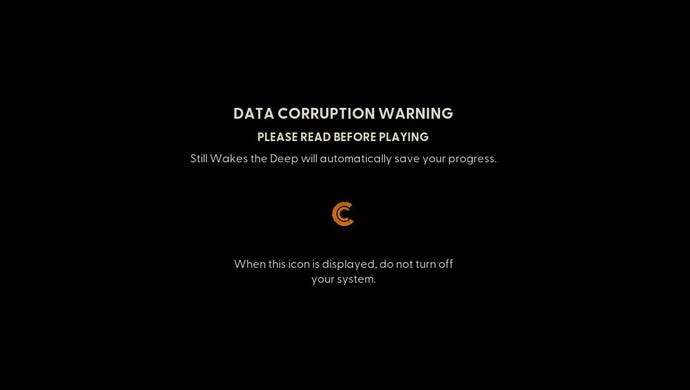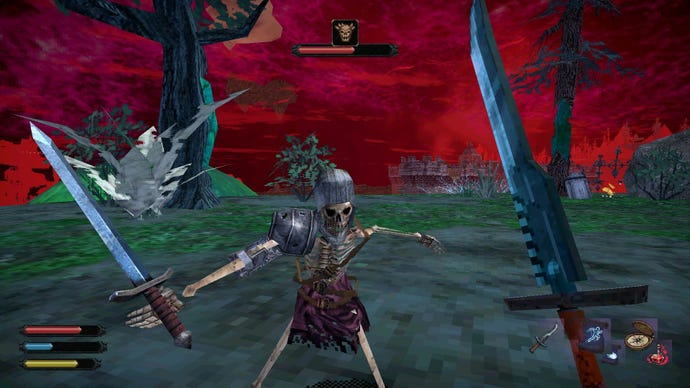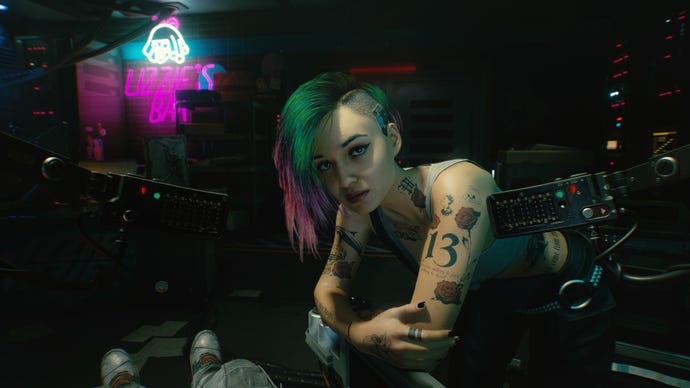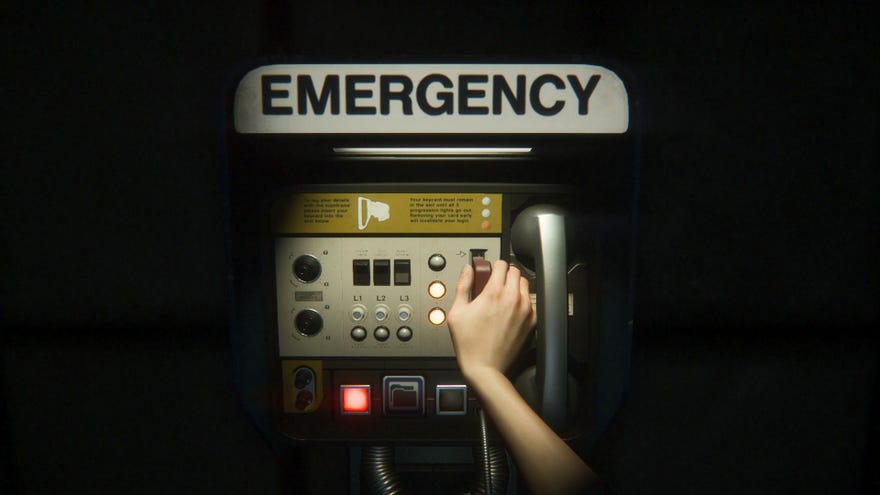I turned my PC off during the "don't switch off" symbol in five different games to see what would happen and boy was this an annoying experiment
A pointless warning?
We've all seen it. The little spinning symbol cautioning players against impatient acts of powering down. "Don't turn off your system when this symbol is displayed," goes the message seen often while booting up a game (or some other version of these words). The implication is clear. The saving process is delicate and if you interrupt this invisible ritual the data that's being written to some folder deep in your PC's innards will become corrupted, wrecked, banjaxed. You will lose all your progress, all your precious swords and accomplishments.
But is this true? How likely are you to really suffer a catastrophic loss of shotgun shells? To find out, I decided to spend a very annoying afternoon of turning my gaming rig off and on again during multiple games. Was this a good idea? I don't know. I'm a gamer, not an ideas man.

This is not a hugely scientific experiment. It's simple. In each game I will hit a save point, watch for the relevent "now saving" icon, and press my "power off" button while the icon is showing. Sometimes the save points will be manual, sometimes they'll be location-sensitive autosaves. In all cases I time the powering-down as best I can. Sometimes I perform the act several times, sometimes I just do it a couple. It is worth noting I only use the "power off" button on my PC. Fear stops me short of cutting power at the wall during this process. That is the scarier version of this same experiment. As we'll see, it may make a big difference.
To aid me in understanding the reasons behind this symbol, I will also speak to developer of Getting Over It, Bennett Foddy. Which feels fitting for an experiment which involves repeatedly restarting something.
But first, let's see what happened. Disastrous data loss? Or sweet foxtrot alpha? Read on to find out!
Hades 2

Mel's violent hike through hell is often auto-saving. It saves between rooms, it saves after picking up boons, after upgrading your altar skills, after picking up post-battle treats, and probably a bunch of other places I haven't noticed. Statistically, someone out there has had a power cut at the exact worst moment, right? Well, I tried to emulate that and to destroy my save file a bunch of times while its witchy "now saving" glyph showed. Nothing happened. Every time I started my PC back up and ran the game, I was safe and sound. It even never knocked me back a single step.
Result: No data loss.
Still Wakes The Deep

The save icon in this first-person horror is a non-intrusive set of spinning circles in the corner of the screen. I attempted the same self-destructive power interrupting, cutting off during a save in many different places on board the oil rig. Nothing went wrong. It is perhaps affirming to learn that The Chinese Room's game is more robust than the rusting machinery used by cheaparse fictional oil company Cadal.
Result: Absolutely fuckaw.
Dread Delusion

The save points of Dread Delusion are ornate contraptions holding shiny crystals, and the save icon is a dusty old tome, again in a screen corner. Of all the games I am trying to corrupt, I harboured a perverse hope this quite-good retro RPG would fall victim to my sabotage. It's made by a small team, I figured, maybe they would not have had time to make their save process absolutely dumbass-proof. But no. Even after multiple tries there was no corruption, no data loss, no catastrophe.
Result: Getting very bored of entering my Windows password.
Cyberpunk 2077

The saving process in Cyberpunk 2077 lasts milliseconds. The little spinny "don't turn off" icon appears and disappears too fast for me to react. To simultaneously cut power and save the game, I would need a second person to help with the process. We would need to treat it with the spectacle-correcting accuracy of a pair of military scientists, counting down and turning our keys at the same time. It is theoretically possible your save data in this game becomes borked by accident, but you literally could not do it if you tried.
Result: Regret starting this pointless experiment.
Alien: Isolation

Aha. Here's one that does the countdown for you. Alien: Isolation's save slots are a thing of beauty, in that they are real physical slots on the space station's walls, into which you insert a little card device. The requisite save symbol also appears (in this case, a small cassette tape). I stuck in Ripley's card, waited for the saving process to begin, confirmed an "overwrite game" message, and promptly slapped off my PC as soon as the cassette appeared. Did the famously crappy machinery of Sevastopol Station corrupt my save file? No. Even the idiots at Seegson electronics appear to be able to make a reliable saving process.
Result: Just glad this is over, to be honest.
Game saved successfully
There you have it. Absolutely no save data horror stories. So why do games show you this warning? Have I just got lucky? Will turning your PC off during a save actually do harm, or is it just some arcane custom of game developers?
"I think the answer is probably ‘it depends’, unfortunately," says Bennett Foddy, maker of Getting Over It. "Yeah, if you yank the power cable from the PC or console while it’s writing your save file, the file write is not going to complete and you’ll get a corrupt save. But, lots of caveats...
"Everyone I know writes to a revolving set of slots, to handle file corruption. So if one file is corrupted it just loads the next most recent one. But there’s no guarantee the game you’re playing does this.
"Some games have teeny save files - like Getting Over It is writing hardly any data at all when it saves. In those cases, you’re just statistically unlikely to interrupt a saving process even if you pull the power cable. Maybe you’d have to turn off the computer 100 times to get unlucky enough to corrupt a file save for that game."
Foddy's last point here reminds me of the Cyberpunk 2077 saving process during my foray into mad science above. In that particular case, the save file may be large or small, I don't know. But however CD Projekt RED handle it, the shooter appears to save incredibly fast, making it unlikely to be interrupted.
But Foddy also reckons my method of pressing the "power off" button is unlikely to do damage at all, since it begins a shutdown process which "should include finishing any file writes in progress and shutting down the drives safely". Aha. So we DO need to repeat this under harder, "power cut at the wall" conditions.
There is another possible reason this warning shows in so many games you play. In some cases it may simply be forced on developers as part of the publishing process. As far back as 2012, Jonathan Blow, the creator of Braid and The Witness, was complaining about this exact requirement in the certification process. In other words, including this warning is one of the rules game makers have to follow to make sure their games can be sold on storefronts like the Nintendo eShop, PlayStation Store, and Steam.
"Every single game is REQUIRED to say on startup, 'sometimes this game saves, when you see this animated icon in the corner, DO NOT TURN OFF YOUR CONSOLE, etc'," wrote Blow in a mail to Ars Technica. "This is something that developers have to implement and that has to be tested, which costs significant time and money, but worse than all that, it impacts the user experience, because the startup of the game becomes just a little more bureaucratized."
Blow goes on to complain about that certification process a lot, basically noting the same thing as Foddy - that there exists a technically reliable way to create a failsafe for data corruption. Which would make the warning pretty much unnecessary.
"[It] also could be a historical console requirement," says Foddy. "I haven’t checked lately (and I suspect the licence would prevent me from telling you, if I did). It could also be developers following kneejerk convention. I bet that’s part of it."
Conclusion
In the end, we may be none the wiser concerning this particular spinning symbol of uncertainty. The certification requirements alone make it likely we'll continue to see it used in our games into the foreseeable future. But, yes, it seems mostly pointless. You are probably more likely to lose your save file to an overzealous housemate or a younger sibling, than to an abrupt loss of power. At least judging by my scientifically rigorous experimentation anyway.
Yet science is an open book. Peer review me, reader! What about you? Have you ever had a save game corruption disaster? Did you lose 55 hours of Persona 5 to the cybervoid? What is the most devastating save loss of your life? Unload your personal history unto me, if we cannot always reliably save the game, let us at least save one another.

